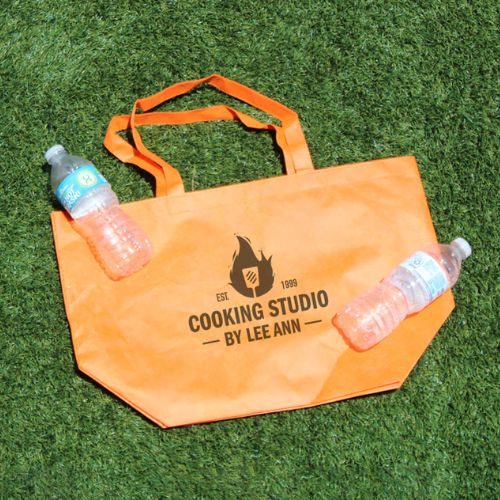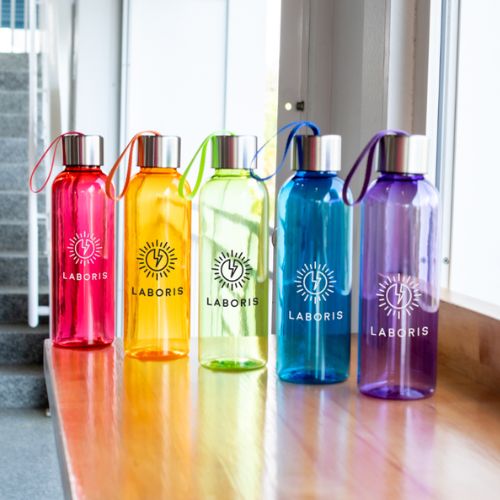Boosting employer branding with promotional items: expert advice
Meet Christine Talens, an employer branding expert. With her extensive knowledge in the field, she has given us some insights into the best ways to make an impact. Learn the tips and tricks from an employer branding expert about how to recruit the right people.

Christine Talens has cultivated a strong understanding of employer branding, with seven years of experience in Talent Acquisition, Learning and Development, and Neuromarketing across several industries. With a background in global talent attraction and acquisition across various sectors, she brings expertise in promotional products and giveaways, including personally handing them out at career fairs.
She is here to discuss how promotional products and employer branding go hand in hand. She explains how to use the promotional product budget effectively to leave a lasting impression on the target audience.
What is employer branding?
Employer branding is the overall representation of a company as an employer - the image it portrays to attract and retain top talent. It encompasses elements such as work culture, company values, and reputation within the job market (Source: Workable).
Christine distinguishes between marketing and employer branding. Marketing typically concentrates on shaping the external image and emotional appeal of a company's brand, often focusing on their products or product lines. In contrast, employer branding focuses on portraying the company as an employer, highlighting the candidate or employee experience.
A strong employer brand is crucial for a company because it directly impacts how job seekers perceive and choose them, and whether current employees decide to remain or seek opportunities elsewhere. This makes it a crucial aspect of a company’s overall branding strategy.
Who is in charge of employer branding?
When you think about developing an employer brand, you might first think of Human Resources (HR) or People and Culture (P&C) departments. They're the ones on the front lines, running campaigns, setting up career fairs, and handing out freebies. Here's the thing: an employer brand isn't just HR's job—it's everyone's job in the company, whether they are aware of it or not. It's truly a team effort.
Various stakeholders play crucial roles in shaping employer branding. Every touchpoint needs to collaborate to convey a cohesive message:
- HR: Manages employees and employee relations, shapes company policies on benefits, work-life balance, and other responsibilities.
- Founders, CEOs, and other C-suite executives: They establish the company's overarching vision and strategies. Their leadership styles and daily actions directly reinforce the organization's core values and culture.
- Managers: They play a crucial role in directly overseeing, leading, and evaluating employees. Like leadership, their daily actions and management styles reinforce the company's core values and culture.
- Marketing team: They are essential in promoting employer branding externally through social media, events, and press releases.
- Employees: Most importantly, employees embody the employer brand. Through dinner conversations, their friends gain personal insights into their work experiences, making employees the primary and often the most important ambassadors of the employer brand.
Is employer branding only important for more established companies?
Christine says no. Every company already has an employer brand—an image and reputation in the outside world, whether they're aware of it or not. The key is whether a company understands how they're perceived and whether they have a strategy to shape that reputation.
Ordering the swag
When you're assigned the task of ordering promotional products for a trade show or as employee gifts, it can feel overwhelming. However, Christine suggests a few immediate considerations when selecting products. These tips can help streamline your search.
What makes a good promotional product?
The answer depends on your event and your goals. When tasked with finding promotional items, consider these three primary factors first:
- Price
Sticking to the designated budget is crucial. According to Christine, once you've set your price point, nearly half of the products in a category can be eliminated from consideration. Factor in branding costs alongside the product price.
- Quality for the price
Christine advises choosing the highest quality products that fit within the budget. The perceived quality of the product can significantly influence how well it is received by the target audience.
- Practicality and “bragability”
Look for balance between practicality and “bragability” - the ability of an item to be bragged about and shared especially over social media. Christine always seeks items that can create excitement at any event. For trade shows, prioritize unique items that make the company stand out. When choosing employee gifts, select items that are not only attractive but also have lasting appeal, encouraging recipients to proudly share and brag about them on their social media.
What are some popular examples of promotional items?
It's challenging to predict which products will perform the best, as this varies based on several factors. According to Christine, practical items tend to be the most effective—ones that people continue to use. Here are some of her top picks from items she has distributed and received:
- Lanyards: Lanyards are practical and can evoke nostalgia, often serving as great conversation starters. Christine still uses the lanyard she received from her university and enjoys seeing others wearing it too. She recalls connecting with someone wearing the same university lanyard, highlighting how even a simple item like this can spark a conversation and leave a lasting impression.
- Socks: While t-shirts and sweatshirts are commonly associated with promotional apparel, socks have been gaining popularity. Christine cherishes and regularly wears a pair she received from a former employer, noting their style and comfort. “They are so cute and cool, I will always have them,” she says.
- Postcards - A postcard with an impactful quote or a clever joke is an excellent choice for a shareable item. When the message resonates, it can also function as office art, adorning an office pinboard with both wit and wisdom.
Distribution & impact of products
When choosing products, it is also important to take the target audience into consideration. Different products will have different impacts based on where they are distributed.
Trade shows and career fairs
At events like trade shows and career fairs, companies aim to create excitement and draw people to their booths. According to Christine, the focus is on choosing items that can be easily photographed and shared on social media. These items are typically small and directly handed out to attendees. The appeal lies in the item itself rather than elaborate presentation.
Popular examples from Christine
- Stickers - These are great to give out at student fairs and events. They are simple and small, but they go quickly, as she recalls from her time at a student fair in Munich.
- Quality notebooks: Functional and stylish, notebooks are essential tools for students in school and job seekers preparing for interviews. The key here is quality, otherwise they will end up in the trash right away.
- Travel accessories: Tailor products to match the industry. For instance, Christine observed that travel accessories like luggage belts were a hit at an aerospace industry show she attended.
These examples illustrate how strategic selection and context-appropriate distribution can maximize the impact of promotional products.
Corporate gifts
Gifting in the business world encompasses various occasions and themes. It includes distributing onboarding boxes to new employees, giving holiday and Christmas gifts to show appreciation, and acknowledging personal milestones such as weddings, births, or birthdays.
The impact of corporate gifts is significantly influenced by their presentation. Thoughtful delivery can enhance the employee experience by:
- Strengthening professional relationships
- Cultivating a welcoming culture of belonging
- Increasing employee retention and loyalty
Can promotional items replace good company culture?
Corporate gift-giving is crucial to company culture, and Christine stresses the need for authenticity in representing it. A truly healthy and happy company culture simply can't be faked. While distributing promotional items as corporate gifts is valuable, they should never replace fair compensation.
Christine emphasizes that effective employer branding is inherently organic, demanding authenticity that extends beyond just giving away cool freebies. Authentic employee and candidate reviews on platforms like Glassdoor or Kununu consistently reveal genuine experiences.
Essentially, promotional items can only compliment a good company culture; they cannot replace it. Employer branding plays a critical role in companies by highlighting their Employer Value Proposition (EVP) which encompasses a nurturing positive work environment, promoting work-life balance, ensuring fair compensation, and offering attractive benefits to employees (Source: Personio).
The future of employer branding
In recent years, there has been a noticeable shift in how companies approach promotional products and corporate gifting, driven largely by sustainability efforts. Distributing disposable items is no longer favored due to their negative environmental impact and wastefulness, both in terms of money and resources.
Christine emphasizes that corporate gifting remains significant and will continue to evolve. While the nature of gifts may change, the underlying sentiment behind them will endure. She predicts that companies may increasingly opt for digital and monetary gifts such as gift cards or top-up credit cards instead of traditional promotional items.
Stay up-to-date on everything Christine is working on by visiting her LinkedIn page. For any questions about her interview, please reach out to her via email. For anything specific with regards to the allbranded experts, be sure to fill out the contact form.
Are you interested in reading more about employer branding topics? Be sure to check out these interesting blogs to give you more information on trade show planning and mastering career fairs.
Link sources:
- Pavlou, Christina. “What is employer branding?” Resources for Employers.
- “The Meaning of Employer Value Proposition (EVP)” Personio.








